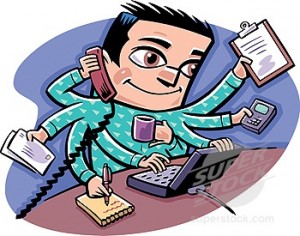We live in a world that is full of the drive to do more, more, more. As writers, we suffer from this expectation maybe more than a lot of other people.
We are expected to write more, blog more, market more, be visible on social media more. It is all Important, with a capital I. Not doing all these things constitutes failure as a writer. Doesn’t it?
So a lot of us turn to multitasking.
What is Multitasking?
How many of you carry on multiple Twitter conversations while writing? Or work on more than one book at once. (And by “at once” I mean at the same sitting, maybe even on separate screens.)
How many of you watch TV while working on copyedits or play solitaire while writing your rough draft? Anyone ever burned dinner because you were sucked into some black hole of research?
The “busy-ness” of multitasking makes us feel like we’re getting a lot done. If we’re honest about it, though, in most of the above cases, multitasking is really just another term for “unable to concentrate on what I’m supposed to be doing.”
So what exactly is multitasking? Multitasking is doing more than one thing, side-by-side, which requires one’s attention to be given equally to each. But since your brain cannot actually focus on two things simultaneously, what you are really doing is switching your attention back and forth between the two things.
Write a paragraph, answer an email, write another paragraph, answer another email. You’re not really working on both at the same time. You’re alternating between two separate things, each of which requires your brain’s undivided attention at the time of the doing.
Writers and Multitasking
Keep in mind that, by “multitasking,” I don’t mean doing different writerly things on different days or at separate times. As a working writer, or one trying to establish relationships with their Right Readers, for example, you may need to assign different tasks to different days. Writing Monday through Thursday, bookkeeping on Fridays, marketing on weekends.
Alternatively, some writers divide their days into different types of tasks…writing in the mornings and answering emails and doing other business-related tasks in the afternoon. None of these examples really falls into the category of multitasking because you are focusing on one task at a time.
Sometimes you have to make time for other tasks besides writing spur-of-the-moment. If you’re published, you’ve probably been deep into the first draft of a new book, only to get your editorial letter or your copy edits and have to completely shift gears. There’s not much you can do about that…because you likely have a deadline.
How Multitasking Affects the Writing
When it comes to the effects of multitasking on the writing, these are the main issues:
- Decreased productivity. While multitasking may make you feel busy, scientists estimate that productivity is actually decreased by 40% when you’re doing more than one thing concurrently.
Switching your focus to something other than the writing every couple of minutes has the same effect as if you saved your document and closed your program after a few paragraphs, only to need to wait for it to open again to work on it once more a few minutes later.
When you work on something else, then come back to the writing, you have to reboot your brain to get reacquainted with where you were before you can start again. If you’d just kept going, that “reboot” time could have been spent actually writing.
- Loss of focus. If the words aren’t flowing easily, they certainly aren’t going to flow any better if you allow yourself to shift focus to something else instead, even for a few minutes. You’d be better off staring into space when things aren’t flowing, and letting your brain work out the problem, instead of giving it something completely different to do.
- Increase in mistakes. Typos, skipping important information in a scene, calling a secondary character by the wrong name. Sometimes, when you’ve switched tasks, your brain is still back on the other one, which can cause errors. Another way mistakes can increase is by loss of continuity. Copy editing while watching TV can cause you to skip sentences. Your focus is pulled away to the television, and when you come back, you don’t go quite back to where you ended, and you miss something.
- Greater stress level. Yes, believe it or not, task-switching increases adrenaline in your system and actually increases your stress level! While working on your manuscript, your mind may be stressing out over what you might be missing on Facebook.
- Decreased likelihood of finishing things…like your work in progress. Starting multiple stories and working on them all at once means it’s going to take longer to get these things completed…if they ever do get finished. (You’re liable to get bored with one or both and move on to yet another shiny pretty new things before ever completing any of it.) Multitasking produces activity, not accomplishment.
Multitasking Solutions
Are we ever going to be able to get rid of multitasking completely? Probably not.
But if you’re struggling to get that chapter done, feeling like you’re never quite “in the zone,” wondering why you feel like you’re missing opportunities on Twitter or Facebook to communicate with your readers, finding yourself making mistakes…STOP. Take a look at your work habits.
It could be that you’re never giving one task all of your attention for any length of time.
Here are a few solutions to making the mistake of multitasking.
- De-socialize. Turn off email and social media notifications while working. Don’t answer the phone. No one is going to miss you for an hour or two. When you’ve completed your writing for the day, feel free to play on Twitter all you want, giving it all your attention instead of only half of it.
- Save things for later. DVR your favorite shows if they come on during your writing time. The show will be just as good at another time. Bonus…you will likely pay more attention to the show AND be able to skip commercials.
- Get rid of distractions. Delete Candy Crush or any other addiction from your phone or computer. If it’s not there, you won’t be tempted to just “play one more level” between paragraphs. Change when you write. If all your writing friends hit Twitter at 6 p.m., can you write before that, so you aren’t tempted to multitask?
- Check into distraction-free writing tools that will help keep you focused.
- Schedule your tasks and your downtime. Put a day without writing on your calendar, and take care of personal things on that day, or feel free to explore marketing or social media more in depth. Schedule a couple of hours of research time in the morning and then work on the scenes you were gathering research for in the afternoon. Don’t research as you go.
With a bit of adjustment, you can disable the multitasking bug most of the time. You’ll find that once you’re focusing better on one task at a time, you’ll accomplish more, faster, and better.
Last month when I wrote my blog post for Rock Your Writing, it took me nearly a week of evenings. This month it took me a few hours one evening, including research time.
Why the big difference? Last month I wrote while watching TV each night. (And if you don’t think Sam and Dean can take your focus away from what you’re supposed to be doing, you’ve never watched Supernatural.)
This month I turned off the TV and concentrated on one thing, researching and writing my blog post. It took me a fifth of the time.
If that’s not proof of the evils of multitasking, I don’t know what is.
Where do you find multitasking tripping you up? How do you solve the problem? I’d love to hear your ideas!
Rock Your Writing!
~Shannon McKelden

